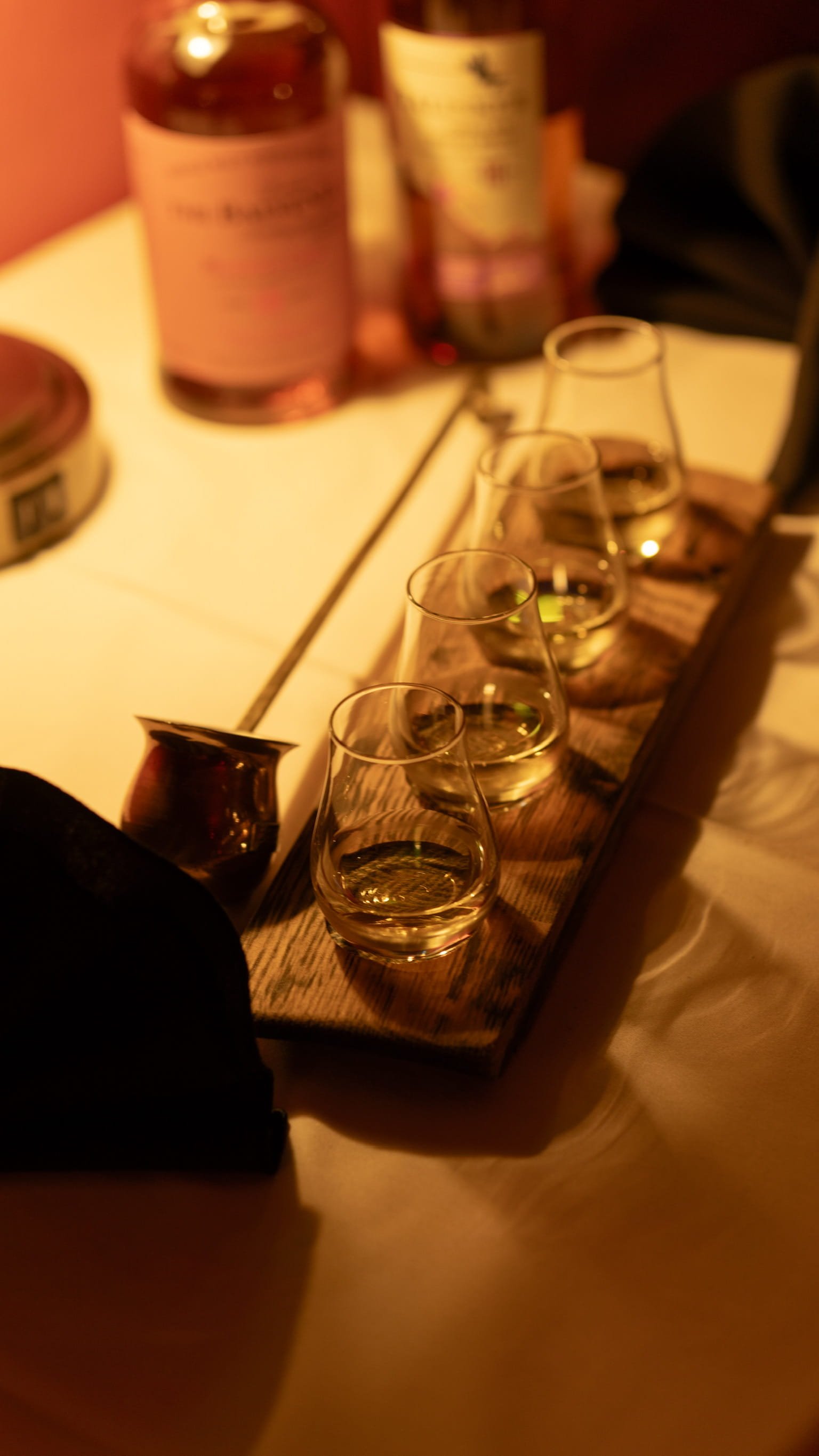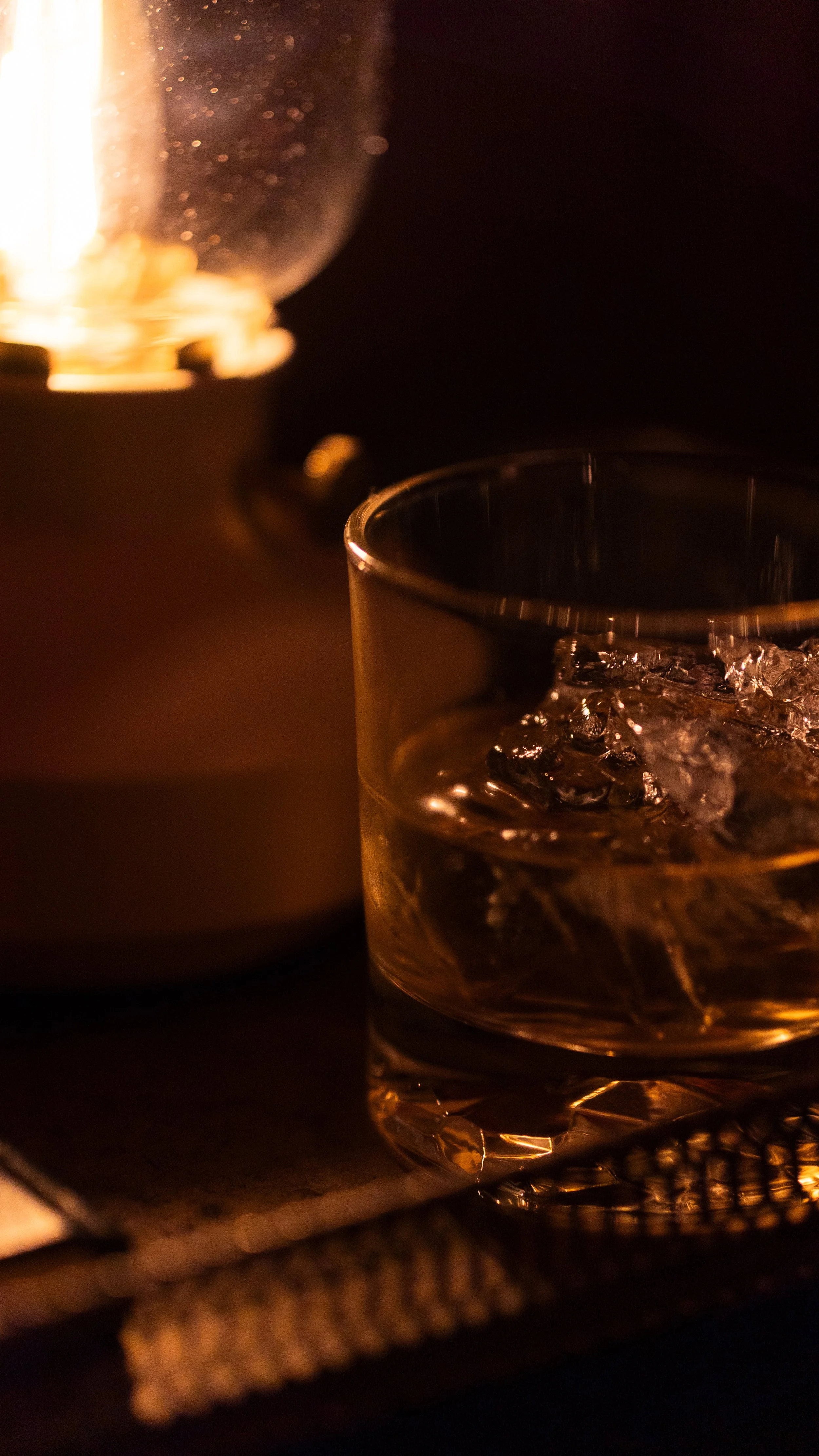The Botanist Cafe Single Malt & Spirits List
“Too much of anything is bad,
but too much good whisky is barely enough.”
Mark Twain
Whisky Tastings
If you're a whisky veteran or just dipping your toe in the barrel, our tastings are just for you. Ask our staff when you drop in — no secret handshake needed.
Whisky Tastings start at $80 - $150
'uisge beatha''usquebaugh''water of life'Highlands
Aberfeldy 12y | $21.00
Aberfeldy 16y | $24.00
Ardmore 21y 1996 | $50.00
Balblair 12y | $18.00
Balblair 17y | $41.00
Dalmore Cigar Malt | $33.00
Dalwhinnie 15y | $17.00
Fettercairn 17y | $44.00
Glen Devron 16y | $28.00
Glen Deveron 30y | $120.00
Glen Dronach Forge 10y | $26.00
Glen Goyne 15y Spirit of Time | $54.00
Glengoyne 18y | $55.00
Glen Goyne Legacy Series Chapter 3 | $33.00
Glen Goyne Teapot 009 | $58.00
Glengoyne Tea Pot 010 | $55.00
Glengoyne Cask Strength | $TBD
Glenmorangie 10y | $18.00
Glenmorangie Duthac | $25.00
Loch Lomond Waypoint 17y | $45.00
Oban 14y | $25.00
Old Pulteney 15y | $43.00
Royal Brackla 21y | $80.00
Tamnavulin Double Cask | $12.00
Tamnavulin Sherry Cask | $12.00
Tomatin Moscatel 16y | $28.00
Islands
Ardberg 10y | $20.00
Bowmore 15y | $29.00
Bruichladdich Organic | $20.00
Bruichladdich Port Charlotte | $23.00
Bunnahabhian (An Cladach) | $29.00
Bunnahabhian (Cruach-mhona) | $28.00
Caol Ila 12y | $20.00
Highland Park 12y | $18.00
Highland Park 15y | $42.00
Highland Park 18y | $50.00
Highland Park 25y | $135.00
Jura Paps 19y | $33.00
Jura 21y | $65.00
Jura Island Expressions | $23.00
Jura the Sound | $23.00
Lagavulin 11y Char Oak Cask | $37.00
Lagavulin 13y | $53.00
Lagavulin 16y | $36.00
Lagavulin Distillers Addition | $45.00
Laphroig 10y | $22.00
Laphroig The Cask Legacy | $41.00
NcNean | $25.00
Talisker 10y | $25.00
Talisker Skye | $15.00
Talisker 18y | $95.00
Talisker Dark Storm | $28.00
Talisker Parley | $28.00
Talisker Skye | $25
Talisker Storm | $19.00
Talisker Surge | $35.00
Torabhaig | $23.00
Speyside
Aberlour 12y | $18.00
Aberlour 14y | $22.00
Aberlour Surtain | $38.00
Aultmore 18y | $47.00
Balvenie 15 Madeira | $40.00
Balvenie Doublewood 12y | $19.00
Benromach | $28.00
Benriach 12y | $22.00
GlenAllachie | $22.00
Glen Devron 16y | $28.00
Glen Elgin 12y | $17.00
Glenfarclas | $23.00
Glen Grant 18y | $41.00
Glenlivet Caribbean | $14.00
Glenlivet 18y | $51.00
Glen Rothes 10y | $15.00
Glen Rothes 12y | $25.00
Glenfiddich 12y | $15.00
Glenfiddich 15y | $19.00
The Macallan Whisky Makers Edition x-Ray #4 | $125.00
Mortlach 14y | $32.00
Mortlach 15 | $50.00
Mortlach 16y | $45.00
Speyburn 10y | $12.00
Tamandhu Batch Strength #4 | $28.00
Tomintoul Peated | $16.00
Tomintoul Sherry | $16.00
Lowlands
GlenKinchie 12y | $18.00
LochLea | $$22.00
Other Scottish
Bruadar | $12.00
Compass Box Spice Tree | $20.00
Dewar's Signature | $59.00
Glayva | $12.00
Monkey Shoulder | $14.00
As we bring in many of our bottles in small quantities this list is subject to change and will be updated periodically
Rest of World
Albion
The English (Hmm) | $300.00
(It’s not really worth this we just don’t want to sell it to you.. the name says it all)
Penderyn (Wales) | $18.00
Across The Pond
Angels Envy (Kentucky) | $35.00
Blanton Gold (Kentucky) | $80.00
Bulleit Bourbon (Kentucky) | $12.00
Elijah Craig (Kentucky) | $12.00
Pierless Distillers Small Batch (Kentucky) | $35.00
Uncle Nearest 1856 (Tennessee) | $25.00
Whistle Pig 10y (Vermont) | $32.00
Woodford Distillers Select (Kentucky) | $18.00
Makers Mark 46 (Kentucky) | $15.00
Micters Sour Mash (Pennsylvania now Kentucky) | $14.00
The Colonies
Bains South African | $15.00
Chas Mackinlay (Shackleton Whisky) | $25.00
Canadian Lot No. 40 | $15.00
Fiddlers Choice (Cape Breton) | $20.00
The Continent
Johnett Single Malt (Swiss) | $25.00
Kyro Peated (Finland) | $15.00
Kyro Sherry (Finland) | $15.00
Slyrs Bavarian 51 (Germany)| $28.00
The Far East
Askashi White Oak (Japan) | $43.00
Ichiros Malt & Grain (Japan) | $30.00
Kavalan Tripple Sherry Cask (Taiwan) | $22.00
Kurayoshi (Japan) | $30.00
The Yamazaki 12y (Japan) | $45.00
Yoichi Nikka Whisky (Japan) | $17.00
Sakurao (Japan) | $41.00
The Yuza Third Edition (Japan) | $35.00
“Whisky is liquid sunshine.”
George Bernard Shaw
-
Both Whisky and Whiskey are correct; however, it depends where the Whisky in question is produced. It's actually quite a simple method that's used all over the World; if the country where the Whisky is produced has the letter E in the spelling, then it's spelt Whiskey (Ireland, for example), but if the country spelling doesn't have an E then it's spelt Whisky (Scotland for example).
-
There are four different types of Whisky, Scotch, Bourbon, Tennessee and Rye. The difference between the four is a mixture of materials used with the mix, how they are filtered/distilled, and the geographic difference of where they are made.
-
Scotch whisky is made in Scotland (hence the name), while bourbon is a whisky made in the USA, most commonly in the central-eastern state of Kentucky. Scotch is made mostly from malted barley, whereas Bourbon is distilled from corn. Tennessee Whiskey and Bourbon's difference is that once the spirit has been distilled, Tennessee Whiskey is filtered through sugar maple charcoal, giving it a sugar / sweeter taste. Bourbon can only be made in brand new oak barrels once; this legal requirement means they are a popular purchase for many distilleries in Scotland.
-
Item descWhisky does not age within the bottle; it ages within the cask. For example, a 10-year-old Whisky has been 'casked' for 10 years and then bottled, unlike with Wine, the year that it has been bottled won't make a difference to the taste.ription
-
Every Whisky is casked for different amounts of time. The more expensive whiskies would generally have been casked for a longer period of time, and the time it's taken to mature would have then affected the price.
-
Adding water to whisky is a personal preference; by doing so, the whisky becomes a little smoother, and the nosing aroma is more apparent as it reduces the alcohol strength. A dash or even just a few drops of water is often enough to make a difference to the taste, smell and look of your whisky.
-
Traditionally 5 main countries around the World produce Whisky, Scotland, Ireland, the United States of America, Canada and Japan. Many others in recent years are joining the elite few, and Whisky is now also made across Europe and every other continent.
-
Scotch Whisky can be broken down into 6 regions, Lowlands, Speyside, Highlands, Campbeltown, Islay and Islands. Click here for more information regarding each of the Scotch Whisky regions.
-
Peat is best described as decaying vegetation that has formed over thousands of years. Some peat bogs can be woody, while other peat can be watery; it all depends on the land. This is then harvested, cut up into small pieces of ‘sod’, stacked and left to dry. Over a period of 2 to 3 weeks, the pieces of peat dry out, and the remaining material is tough peat ‘bricks’ that contain more energy than coal.
The peat is then burnt within the distilleries, and the grain is then exposed to the smoke of the burning peat. This then brings the smoke into contact with the grain, giving the whisky a peaty taste. The amount of time the grain is exposed to the peat smoke determines the whiskey's taste and the peat's strength, adjusting the spirit’s flavour.
-
There are variations of whisky glasses. The traditional tumbler is still commonly used, but the Glencairn Whisky Glass is the most popular and widely used by drinkers, connoisseurs, and distillers.



